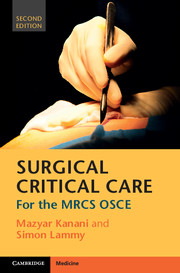4 - Disability (neurological evaluation)
from Section 1 - Ward care (level 0–2)
Published online by Cambridge University Press: 05 July 2015
Summary
Assessment
Neurological assessment
Which basic investigations may be used in assessing neurological function?
Following basic clinical examination of the central and peripheral nervous system, investigations may include
Non-invasive
Glasgow Coma Scale (GCS): this is a clinical assessment of a patient's ability to see a threat, communicate a threat and generate a motor response to defend itself. The maximum score is 15 and the lowest score is 3
▪ Eyes (Max 4): spontaneous eye opening (4), opens eyes to a vocal stimulus (3), opens eyes to a painful stimulus (2), no eye opening (1)
▪ Voice (Max 5): coherent speech (5), confused speech (4), inappropriate words (3), sounds (2), no sounds (1)
▪ Motor (Max 6): obeys commands (6), localises to pain (5), withdraws from pain (4), flexor decorticate response (3), extensor decerebrate response (2), no response (1)
▪ Radiology: high-resolution CT – head, MRI – head
▪ Transcranial Doppler (TCD):measures blood velocity in large cerebral arteries, e.g. middle cerebral
▪ Electroencephalograph (EEG):measures electrical signals generated in central neural tissue
The assessment of the GCS is extremely important, and must be measured again if unsure until a precise score has been determined. Of the three components, a drop in the motor score is most prognostic.
NB. The term ‘scale’ regards the observed description of each component, e.g. ‘spontaneous eye opening’, whereas the term ‘score’ is simply the summation of the points score in each section, e.g. 12. The term ‘score’ in isolation from the term ‘scale’, simply provides a number but no clinical context, as a score of 12 can be composed of many different variables when accessing eyes, voice and motor.
Invasive
Lumbar puncture (LP): is used to extract cerebrospinal fluid (CSF) for visual, microbiological, cytological and
biochemical analysis
Intracranial pressure monitoring (ICP): e.g. ICP bolt, is useful to measure actual, and fluctuations in the, intracranial pressure to predict deterioration in patients where GCS cannot be measured
Digital subtraction angiography (DSA): this is the gold standard diagnostic procedure for investigating cerebral ischaemia, but its complications include stroke
- Type
- Chapter
- Information
- Surgical Critical CareFor the MRCS OSCE, pp. 156 - 182Publisher: Cambridge University PressPrint publication year: 2015



